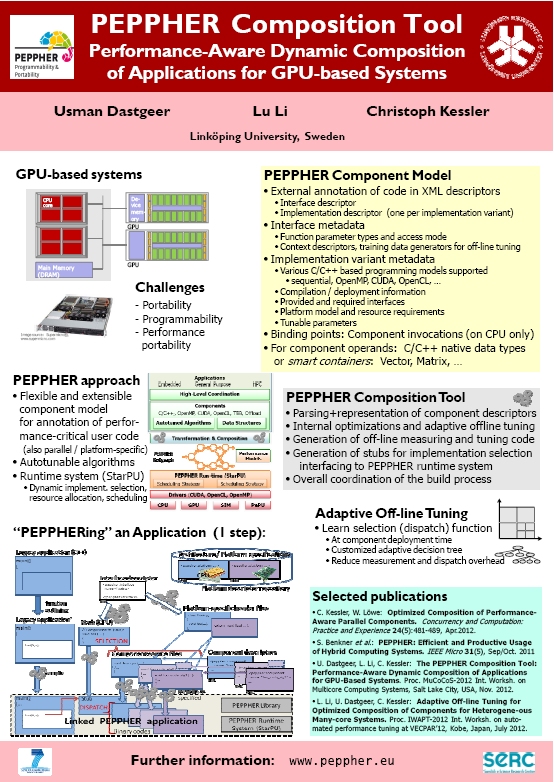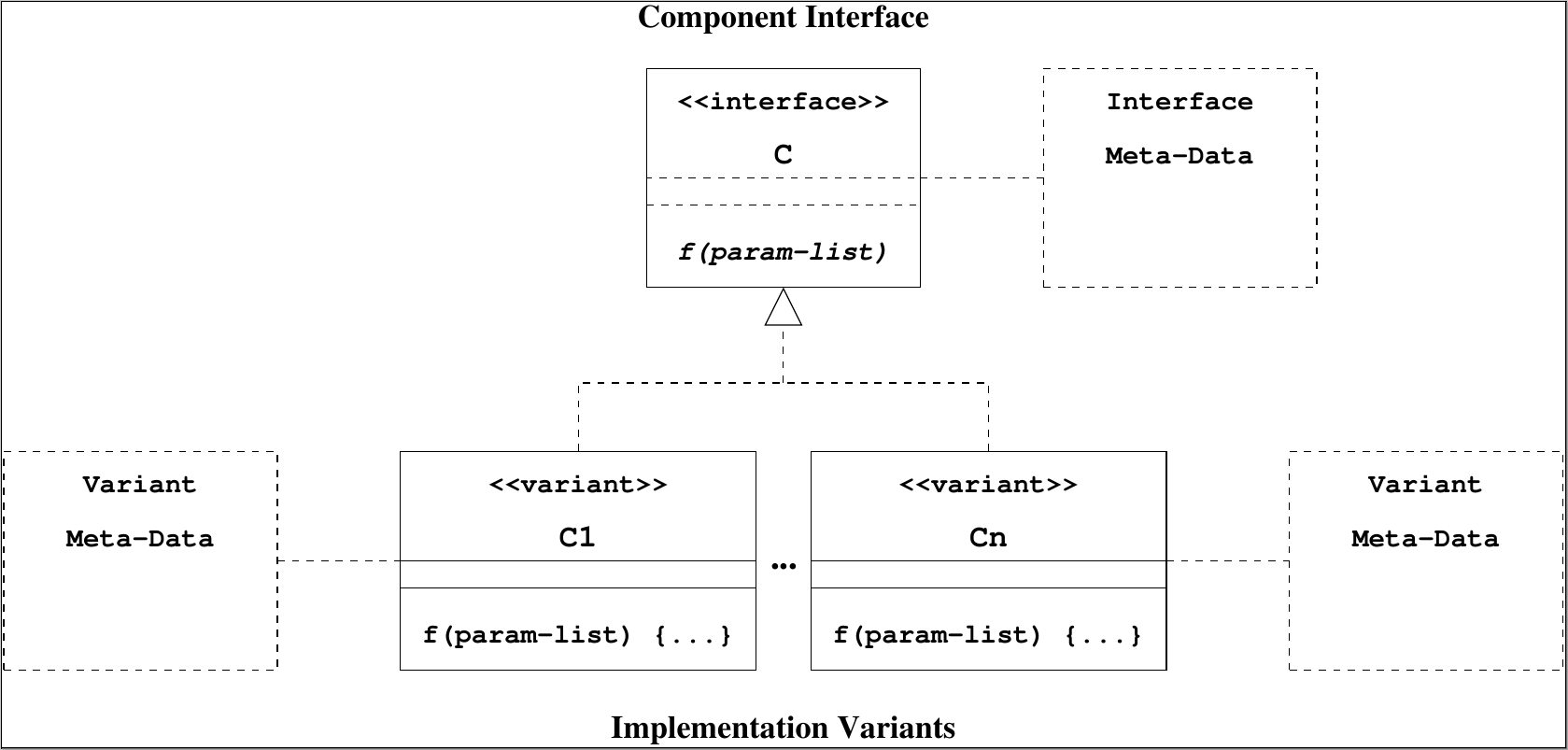 PEPPHER Composition Tool: Performance-Aware Dynamic Composition of Applications for GPU-based Systems.
PEPPHER Composition Tool: Performance-Aware Dynamic Composition of Applications for GPU-based Systems.
Poster presented at ACACES-2012 and the HiPEAC-2013 conference.
Poster PDF


| PEPPHER Component Model | Composition Tool Features | Information Sources | Technical Manual | Contact |
The PEPPHER Composition Tool ComPU is a research prototype developed
by
Lu Li,
Usman Dastgeer
and Christoph Kessler at
Linköping University (Sweden),
for the EU FP7 project PEPPHER (2010-2012).
Its further development since 2013 is partly funded by
SeRC, project
OpCoReS (Optimized Composition and Runtime Support for e-Science),
and (in 2013) by
ComPU
builds optimized C/C++ based applications for GPU-based systems
from user-defined application-level building blocks
(PEPPHER components) with multiple implementation variants,
which are written and annotated using the
PEPPHER component model.
The composition tool generates glue code that will, at run-time,
automatically select for each call to a PEPPHER component
among its available implementation variants
the expected fastest one, based on a performance model.
Currently, the composition tool supports component implementations written in sequential C/C++, OpenMP, CUDA and OpenCL, and for execution it uses the PEPPHER runtime system (which is built upon the open-source StarPU runtime system). The default is dynamic composition, i.e., generating multi-variant tasks for StarPU which performs context-aware composition (implementation selection and resource allocation) at runtime. Besides dynamic composition, the composition tool also supports user-guided static composition and static composition by building off-line a performance model that is inspected at runtime for fast implementation selection.
We have also designed an adaptive sampling method for off-line performance modeling and implemented it in the PEPPHER composition tool.
The PEPPHER component model is a comprehensive framework for annotating
software components for heterogeneous multicore systems that are written
in various programming models for CPUs and GPUs with rich metadata to
expose their variation points and tuning options to an external software
composition tool.
Instead of hardcoding such performance optimizations for a specific
platform configuration in the application code, a composition tool
will generate code for the application from its components and their
implementation variants such that
the composed code automatically adapts its runtime behavior (e.g., selection of
implementation variants, scheduling, resource allocation, ...)
for a given platform and for a given runtime context (which might
comprise performance-relevant properties such as problem sizes or
current load of processing units), in order to optimize program execution.
This supports both code portability and performance portability.

The PEPPHER component model is generic in its design; however, it is currently realized in C/C++ so we will here discuss it with respect to C/C++.
A PEPPHER component consists of an interface and one or more implementations of that interface. Both interface and implementations are complemented with extra information (called "meta-data") in the form of XML descriptors. In this sense the PEPPHER component model is non-intrusive, as it require very little direct modification in the user code.
void sort(float *arr, int size);Besides the function declaration, an interface has an associated XML descriptor which provides extra information (i.e., metadata) about the interface. This includes information about:
A PEPPHER component implementation implements the functionality promised by a PEPPHER interface while keeping the same calling interface (return-type, parameter-types).
For example, for the sorting interface, we might have the following implementations:
void qs_cpu_imp(float *arr, int size)
{
...
}
void ms_cpu_imp(float *arr, int size)
{
...
}
void qs_gpu_imp(float *arr, int size)
{
...
}
void bs_gpu_imp(float *arr, int size)
{
...
}
Like component interfaces, each PEPPHER component implementation
has an associated XML descriptor describing this implementation's meta-data.
The implementation descriptor specifies:
 PEPPHER Composition Tool: Performance-Aware Dynamic Composition of Applications for GPU-based Systems.
PEPPHER Composition Tool: Performance-Aware Dynamic Composition of Applications for GPU-based Systems.
Poster presented at ACACES-2012 and the HiPEAC-2013 conference.
Poster PDF
Usman Dastgeer, Lu Li, Christoph Kessler:
The PEPPHER Composition Tool: Performance-Aware Dynamic Composition of Applications for GPU-based Systems.
In: Proc. 2012 Int. Workshop on Multi-Core Computing Systems (MuCoCoS 2012),
Nov. 16, 2012, Salt Lake City, Utah, USA,
in conjunction with Supercomputing Conference (SC12).
ISBN 978-1-4673-6218-4,
DOI: 10.1109/SC.Companion.2012.97, IEEE.
Author version (PDF)
Lu Li, Usman Dastgeer, Christoph Kessler:
Adaptive off-line tuning for optimized composition of components for heterogeneous many-core systems.
Proc. Seventh International Workshop on Automatic Performance Tuning
(iWAPT-2012), 17 July 2012, Kobe, Japan.
In: Proc. VECPAR-2012 Conference, Kobe, Japan, July 2012,
Springer LNCS vol. 7851, pp. 329-345, 2013.
Author-version (PDF)
Usman Dastgeer and Christoph Kessler:
Conditional component composition for GPU-based systems.
Proc. MULTIPROG-2014 workshop at HiPEAC-2014, Vienna, Austria, Jan. 2014.
Author version (PDF)
Usman Dastgeer, Lu Li, Christoph Kessler:
The PEPPHER Composition Tool: Performance-Aware Composition for GPU-based Systems.
Computing, vol. 96 no. 12 (2014), pages 1195-1211,
ISSN 0010-485X (print) Dec. 2014 / 1436-5057 (online), Nov. 2013
(DOI 10.1007/s00607-013-0371-8). Springer.
Lu Li, Usman Dastgeer, Christoph Kessler:
Pruning strategies in adaptive off-line tuning for optimized composition of components on heterogeneous systems.
Parallel Computing 51:37-45, Jan. 2016 (print),
DOI: 10.1016/j.parco.2015.09.003.
- Slides (PDF)


 This work was funded by EU FP7 project PEPPHER
during the project period, 2010-2012.
This work was funded by EU FP7 project PEPPHER
during the project period, 2010-2012.